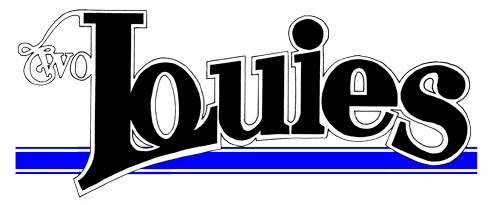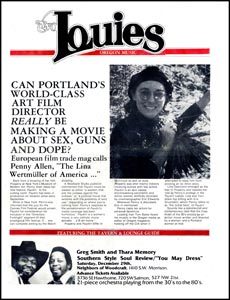Below are the digital remastered Two Louies PDFs 1979. This was the first year that Two Louies Magazine was published
Two Louies Magazine: Volume 1, Issue 1, December 1979
Once upon a time in 1970s backwater Portland, Oregon, there was a little monthly publication called the Oregon Tavern & Lounge Guide that catered to the city’s burgeoning club scene.
OTLG’s publisher, genially laid-back Bob Rider, had a knack for selling ads for his paper. And his club listings were second to none. Nearly every club in Portland was listed in the TLG, and the calendars for those that provided live music were accurate and incredibly extensive. Many venues highlighted their shows with elaborate ads.
There were always a few articles included in every issue— written for, by and about Portland musicians, who performed in the clubs listed in the back pages of TLG.
The Tavern and Lounge Guide filled a niche. It was not at all a glamorous rag. The layout was messy. There weren’t a lot of photos available. It was one of those obscure tabloids typically picked up in a bar, glanced through, and left behind.
Into this bucolic scene blew firebrand ex-Marine, ex-cop, JB “Buck” Munger. Buck came to the Tavern and Lounge Guide with an imprimatur of music industry savvy unrivaled among local publications. In reality there wasn’t anybody like Buck in Portland, period! He rolled in like a rainmaker—ready to make the hits rain down in Portland town.
While representing various lines of guitars, amps and other music equipment earlier in the ‘70s, Buck demonstrated his wares to the stars, hobnobbing with such icons as Hendrix, Clapton and the Eagles, but especially with ZZ Top and the Who; while bringing with him a practical knowledge of the So Cal music industry quagmire, top to bottom. From recording and production know-how, to bombastic promotion, to intrinsic insights into potential professional legal minefields typically associated with the business, he’d seen it all.
Buck arrived with a vision for the Oregon Tavern & Lounge Guide: to transform the sleepy paper into a Northwest music industry juggernaut, something along the lines of Billboard magazine, where he once worked for a time.
Partnering with Bob Rider, who already had a viable product, as well as a specific expertise at generating advertising dollars, made perfect sense. It was a marriage made in heaven.
The first order of business was to burn TLG to cinders—from which would rise an incomparably unique Oregon music industry publication, suitable for the swinging 1980s.
To begin with: that name had to go! Tavern & Lounge Guide had no zest, no zing. It sounded about as appealing as a phone book. Buck looked at the initials TLG, and with typical marketing aplomb, took the letters TL and called it Two Louies—a name that vaguely, possibly referenced the Kingsmen—enough so that some hip legitimacy could be proclaimed for the exciting new monthly, regardless of its more shabby heritage.
And thus was born Two Louies magazine, Oregon’s first and only publication devoted specifically to the music industry, not just to musicians and their music, but to the business side, an aspect for which most ground-floor musicians had no clue, nor inclination.
Here we find the very first issue of Two Louies magazine. It is, indeed, a weird hybrid of the old Tavern & Lounge Guide. The club listings are laid out identically and referenced as such. Nearly all the advertisers are from the old publication, as well as most of the writers and production staff. The layout remains maddeningly dull.
It’s essentially a new look and a new attitude—although there are mysterious references within to some previous issue, which was not Two Louies, but probably Tavern & Lounge Guide. Confusing.
And nowhere on the masthead can be found the name of Buck Munger. Ostensibly, the magazine was published by “Rider/Outpost,” with Bob Rider in charge of sales and one “Riley Outpost” assigned as editor. Buck is mentioned (and pictured) on page 12 in some indistinct reference, as a potential enigmatic bigwig, far too busy to be interviewed by paltry Two Louies–apparently. Strange!
But, even though he is only mentioned obscurely, Buck Munger’s fingerprints are all over this first issue of Two Louies. It appears that every article not attributed to a specific writer is assembled by Buck.
Consisting primarily of interviews with the likes of promoter David Leikin and Oregonian music writer John Wendeborne, Buck’s contributions are patently industry slanted. In all cases he’s asking if local Portland musicians measure up to national criteria (in most cases the answer is no, or not quite).
It’s clear that Buck is seriously name dropping and pushing the envelope, in an attempt to make Two Louies a viable regional music industry rag, like a distant Billboard cousin. That was certainly something Portland had never seen before! This is most clearly demonstrated in the unveiling of his gossip column, As The World Turntables, subtitled “The Grand Ol’ Soap Opry.” Until 2005, that beat went on every month uninterrupted.
As with everything else Buck compiled for this first issue of Two Louies, As The World Turntables goes unattributed. But the style is unmistakably his, as substantiated every month thereafter, over the course of twenty-five years and nearly three hundred issues.
By spring of 1980, Bob Rider had been unceremoniously shoved out of the picture. He was back to independently publishing Oregon Tavern & Lounge Guide, while Buck took the reins of Two Louies.
According to many sources, the split was initiated by a bit of chicanery Buck employed to dupe the congenially naïve Bob Rider. And it was true that once the name Buck Munger finally emerged onto the masthead of Two Louies magazine, the names of Riley Outpost and Bob Rider were henceforth conspicuously absent.
As a piece of Portland music history (and trivia), this first issue of Two Louies is a veritable treasure trove. The articles, listings and ads are full of familiar names of venues and musical acts—some that still ring bells over time. While many are lost to obscurity, there are several veterans whose names continue to resonate in Portland music today.
As a definitive overview of the Portland music scene in December 1979, there is no better source than the debut issue of Two Louies magazine.
Throughout it’s vaunted history, Two Louies withstood challenges from many competitors—especially as the Portland music scene grew, from the early 90s onward. But, in the end, until the publication of the final issue in April 2005, Two Louies prevailed.


